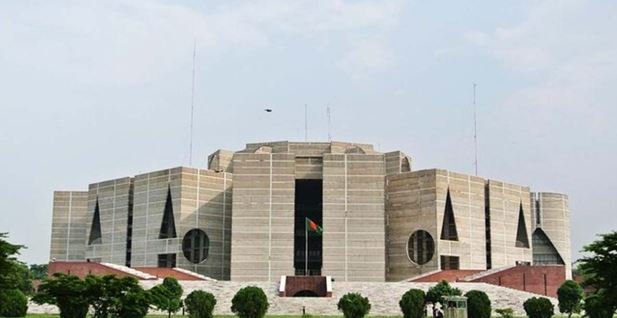In the objective of the bill is to ensure speedy redress of land related offences and to preserve land ownership and maintain peaceful usufruct.
In a significant move aimed at promoting fair land distribution and preventing land-related offenses, Bangladesh’s parliament, the Jatiya Sangsad, recently approved the Land Reforms Bill 2023. This comprehensive legislation not only sets a maximum limit on individual land holdings but also addresses various land-related issues, including land fraud.
Earlier on Tuesday (12th September), the Land Crime Prevention and Remedy Bill 2023 received unanimous approval through voice votes in parliament. During a press conference, journalists inquired about the proposed Land Reforms Bill 2023.
A representative from the Ministry of Land highlighted the historical context, mentioning that in the past, Zamindars held the majority of land. In 1950, a law was enacted, capping land ownership at a maximum of 375 bighas. Following Bangladesh’s independence, Bangabandhu Sheikh Mujibur Rahman, the nation’s founding father, further reduced the allowable land ownership to 100 bighas.
You can also read: Evolution of Bangladesh-Denmark Relations: Sustainable Development Partners
In 1984, during the rule of military leader Hussain Muhammad Ershad, the land ownership limit was further decreased to 60 bighas.
However, the full implementation of these provisions has been delayed, and the government is now taking steps to enforce them.
Limiting land ownership
One of the most prominent aspects of the Land Reforms Bill 2023 is the provision that restricts an individual’s land ownership to a maximum of 60 bighas of agricultural land. This move reflects the government’s commitment to curbing the concentration of land in the hands of a few, ensuring that land resources are more equitably distributed among the populace.
Under the bill, if an individual possesses more than the stipulated limit, the government has the authority to acquire the excess land.
However, it’s important to note that this provision does not apply to cooperative societies, tea gardens, coffee, rubber, and fruit orchards, or land used for industrial raw materials.

Additionally, landowners engaged in export-oriented industrial and agro-processing activities, waqfs, and religious trusts are exempt from this provision.
Land Secretary Md Khalilur Rahman stated that if the inherited land exceeds 60 bighas, the landowner may retain 60 bighas of their choice, while the government may designate the remaining land as government-owned (khas land) by providing compensation at fixed rates.
It is essential to note that there are eight exceptions to this rule, including cooperative associations, which are allowed to possess more than 60 bighas of land.
Land Minister Saifuzzaman Chowdhury mentioned that the issue would be resolved by issuing detailed guidelines.
.
Penalties for land forgery
The Land Offences Prevention and Remedy Bill, passed alongside the Land Reforms Bill, introduces stringent penalties for land forgery.
According to the bill, occupying land is only permissible if one has acquired the right of ownership or possession through the latest khatian owner, their heirs, a legally executed deed of transfer or possession, or a court order. Unlawful possession will result in a two-year imprisonment penalty.
The bill specifies that anyone lacking a valid certificate issued or updated under the State Acquisition and Tenancy Act, along with proof of payment for the certificate and current land development tax, cannot engage in activities such as selling, donating, or transferring the land, or executing a power of attorney.
Furthermore, the bill states that individuals who excavate the topsoil of arable land without the district commissioner’s permission will face a two-year prison sentence. The same punishment is proposed for those aiding and abetting offenders in committing this offense.
Revamping land surveys
During the debate on the bill, Land Minister Saifuzzaman Chowdhury announced the cancellation of all ongoing land surveys that were being conducted using outdated methods. Instead, the government will focus on digital surveys, which are expected to enhance accuracy and transparency in land records.
Minister Chowdhury acknowledged that there have been complaints about irregularities in the ongoing land surveys, leading to dissatisfaction among the public. He highlighted the Bangladesh Digital Survey initiative, which aims to modernize land surveys and has already initiated pilot projects in Patuakhali and Barguna.
Act’s primary aim
The Land Crimes Prevention and Redress Act’s primary aim is to discourage individuals from engaging in unlawful activities related to land.
Furthermore, Land Minister Saifuzzaman Chowdhury stressed that the bill is designed to promptly respond to land-related crimes, protect land ownership rights, and promote peaceful land utilization.
In addition, it was highlighted by the minister that the formulation of this legislation was a complex and sensitive process, involving thorough consultations with a wide range of stakeholders, both at the individual and organizational levels, during its drafting phase.
Resolving land disputes
The Land Offences Prevention and Remedy Bill also incorporates clauses for addressing land disputes through arbitration, alongside the customary court proceedings. This alternative approach to resolving disputes is anticipated to accelerate the resolution of land-related matters and alleviate the judicial system’s workload.
Historical context
In Bangladesh, land ownership is regulated by a complex network of laws, which impose restrictions on the extent of land an individual or entity can own. Initially, the State Acquisition and Tenancy Act (STA) of 1950 established a limit of 375 bighas for both agricultural and non-agricultural land holdings.
However, the Bangladesh Land Holding Limitation Order (BLHLO) of 1972 subsequently reduced this threshold to 100 bighas, highlighting its significance.
Furthermore, the Land Reforms Ordinance (LRO) of 1984 further refined this limit, capping agricultural land ownership at 60 bighas. It’s worth noting that these laws, while providing a fundamental framework, also offer provisions for exceptions and government discretion in specific cases.
The effective enforcement of these regulations is of utmost importance to mitigate land disputes and ensure responsible land management throughout Bangladesh.


